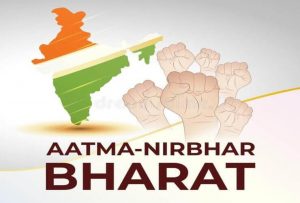Starting with Demonetisation defended as ‘Action against looters of Nation’s wealth’ to the present Atma-Nirbhar Bharat to espouse ‘Vocal for Local’, the idea of nationalism has been advanced, as a strategic push, by the government for mass persuasion and influence in India. The approach begs some serious questions. An in-depth analysis by Ram Krishna, exclusively for Different Truths.
Richard H Thaler, the father of “Nudge theory”, and winning the Nobel economics prize for that, presented the concept of a nudge as a relatively subtle policy shift that encourages people to make decisions. It is about making it easier for people to make a certain decision that is in their broad self-interest.
But Thaler may be intrigued to see how his novel change-management concept is being taken forward at such a mega scale in the public life of a nation.
That nationalism could be a tool to nudge people for a targeted behavioural pattern in India is a fresh and interesting revelation. The way nationalism is leveraged as an influencing tool in policymaking and wider political action is unique, and maybe a subject of a separate study in the domain of behavioural economics, political science and mass communication.
That nationalism could be a tool to nudge people for a targeted behavioural pattern in India is a fresh and interesting revelation. The way nationalism is leveraged as an influencing tool in policymaking and wider political action is unique, and maybe a subject of a separate study in the domain of behavioural economics, political science and mass communication.
The Traction
Let us see how this idea of nationalism in recent times has received traction with a strong intent for mass persuasion and influence in the matters of governance and political action.
Economic reforms like GST, as ‘One Nation, One Tax, One Market’, power sector reform as ‘One Nation One Grid’ (now, Gas, Water grid added), payment system as ‘One Nation One Card’, tracking vehicles on road as ‘One Nation One Tag’, have been espoused with an overt tinge of nationalism.
Demonetisation was defended as ‘Action against Nation’s looters’. Make in India,  Digital India, Start-Up India, Stand-Up India schemes were conceived to unlock India’s entrepreneurial potential of ‘New India’. Economic reforms like GST, as ‘One Nation, One Tax, One Market’, power sector reform as ‘One Nation One Grid’ (now, Gas, Water grid added), payment system as ‘One Nation One Card’, tracking vehicles on road as ‘One Nation One Tag’, have been espoused with an overt tinge of nationalism. The fervour was even higher in hailing abolition of Article 370 as establishing ‘One Country One Constitution’.
Digital India, Start-Up India, Stand-Up India schemes were conceived to unlock India’s entrepreneurial potential of ‘New India’. Economic reforms like GST, as ‘One Nation, One Tax, One Market’, power sector reform as ‘One Nation One Grid’ (now, Gas, Water grid added), payment system as ‘One Nation One Card’, tracking vehicles on road as ‘One Nation One Tag’, have been espoused with an overt tinge of nationalism. The fervour was even higher in hailing abolition of Article 370 as establishing ‘One Country One Constitution’.
The Logic
The logic to advance the nationalistic line runs like this:
For population control, so the narrative goes, we need nudging people for small families. Those opting for fewer kids need to be ‘honoured’. Choosing to restrict the size of families is an expression of love for the nation. Family planning is thus clearly linked to Nation-building.
Nudging active participation of the private sector and corporates are seen as a must. If wealth is not created, it will not be distributed. If wealth is not distributed then the poor cannot benefit. So ‘Corporates are our nation’s wealth creators’. They should be given pride of place.
For achieving a five trillion dollar economy, we need investment, particularly private investment. Nudging active participation of the private sector and corporates are seen as a must. If wealth is not created, it will not be distributed. If wealth is not distributed then the poor cannot benefit. So ‘Corporates are our nation’s wealth creators’. They should be given pride of place.
To advance the proposal of simultaneous elections, we need to nudge the Election Commission/political parties/agents/voters to appreciate the disadvantages of frequent elections- ‘draining the scare resources of the nation’. So ‘One Nation One Election’.
For reviving demand and consumption, and creating jobs, we need to support local businesses and industry. So urging people to buy and promote local products, to be “vocal about local” is the need of the hour.
For reviving demand and consumption, and creating jobs, we need to support  local businesses and industry. So urging people to buy and promote local products, to be “vocal about local” is the need of the hour. This is also the time to boycott foreign (read Chinese) goods! The clarion call is “Atmanirbhar Bharat”.
local businesses and industry. So urging people to buy and promote local products, to be “vocal about local” is the need of the hour. This is also the time to boycott foreign (read Chinese) goods! The clarion call is “Atmanirbhar Bharat”.
‘Ek Bharat is Shrestha Bharat’ also well captures the approach.
The Impact
The phrases and slogans with nationalistic touch, by and large, resonates with people. So when such an idea is invoked as a nudge to achieve consensus or influence people to rally around the narrative of the State, people are seen broadly subscribing to it. Nationalism, with its different reflections in nomenclatures such as ‘India’, ‘Bharat’, ’Motherland’, ‘New India’ gives meaning and relevance to our identity, our roots and so has an impact. Nationalism and the attendant sense of identity, thus, plays a major part in the determination of our behaviour, be it economic, social or political.
The Limitations
However, while we observe, at a macro level, nationalistic pitches to act as a nudge to help achieve broader objectives, there remains, at another level, serious challenges to nation-building. At a micro level, we are a witness to acts of mobocracy, absence of public order, a crime against women and other vulnerable groups, absence of basic health services, corruption — just to cite some of the moral failures and governance vacuum.
However, while we observe, at a macro level, nationalistic pitches to act as a nudge to help achieve broader objectives, there remains, at another level, serious challenges to nation-building. At a micro level, we are a witness to acts of mobocracy, absence of public order, a crime against women and other vulnerable groups, absence of basic health services, corruption –– just to cite some of the moral failures and governance vacuum.
All this triggers some points to ponder:
Whether nationalism as a nudge works better for bigger goals only, like national security, sovereignty, national pride etc.?
Whether nationalism with its big overriding sweeps clouds public debate, and spirit of enquiry?
Whether such a tool, by being overwhelming, restricts human choices?
Does nationalism work at the emotional or peripheral level, and for short time horizons only, with limitations in changing things at an individual level or grass-root level?
Going Forward
Clearly, the questions call for wider debate. And also the need for different creative nudges to bring changes on the ground, through deeper participation of people.
Nudge changes behavioural responses, a crucial link in remaking of man.
Nudge changes behavioural responses, a crucial link in remaking of man. In this remaking task, we need not only more imaginative designs of nudges but also a climate of debate, reasoning and scrutiny, in all public engagements.
Photo from the Internet






 By
By

 By
By